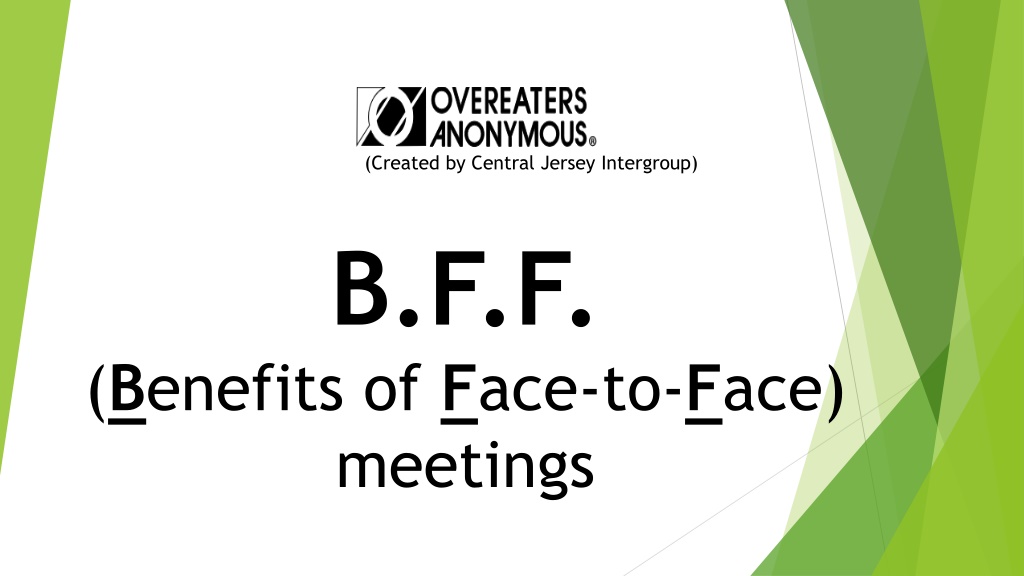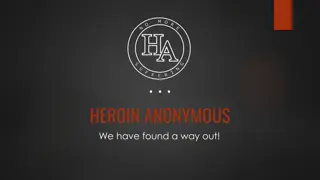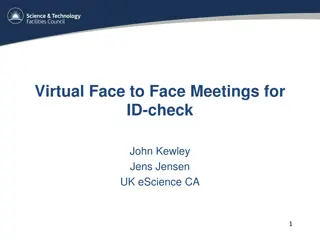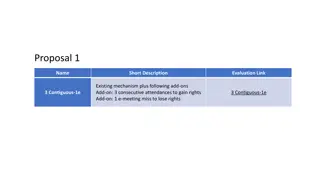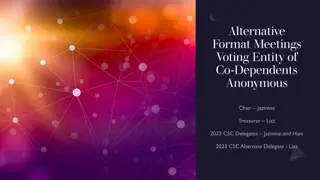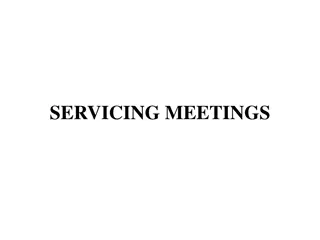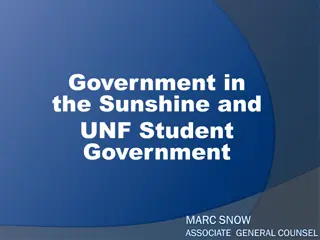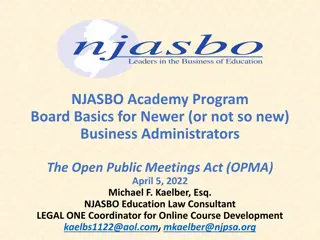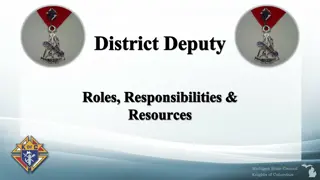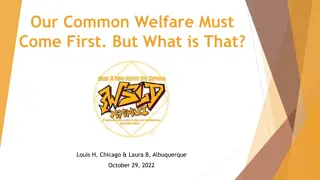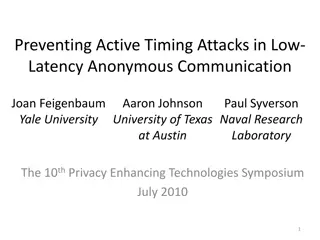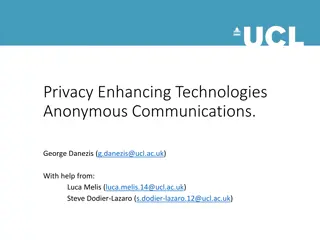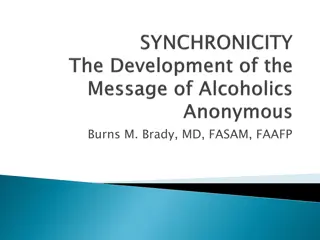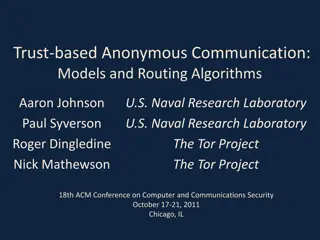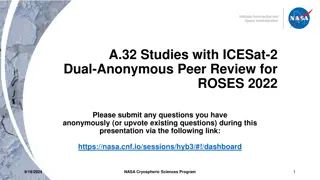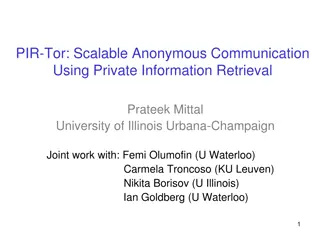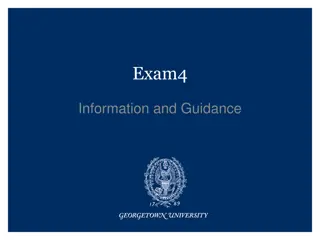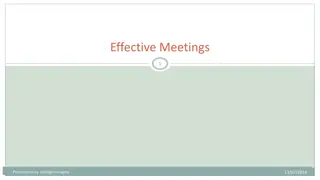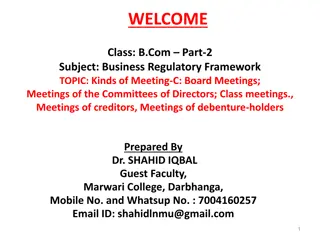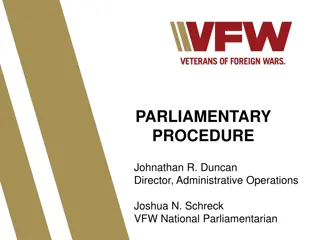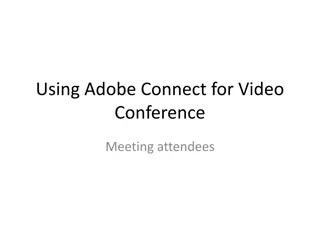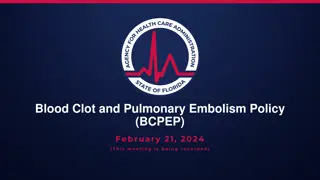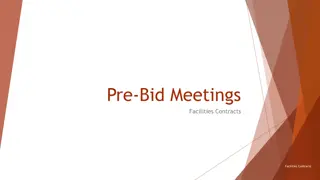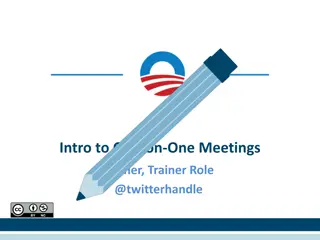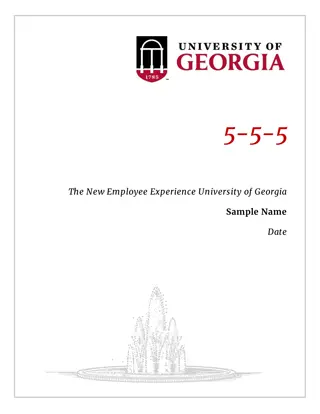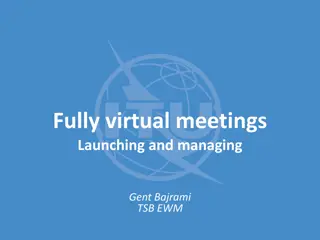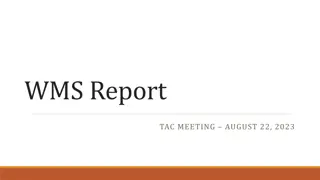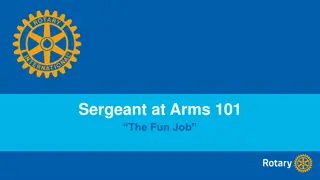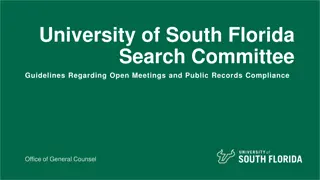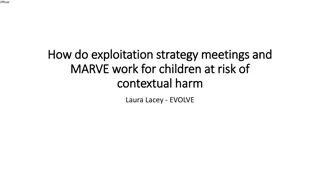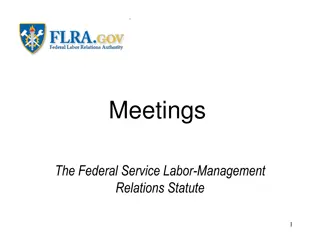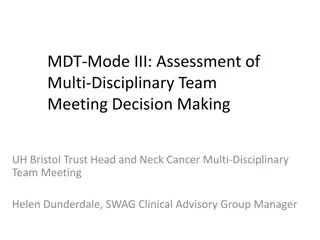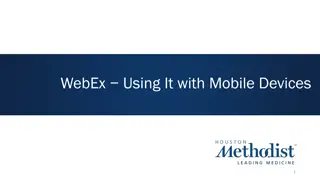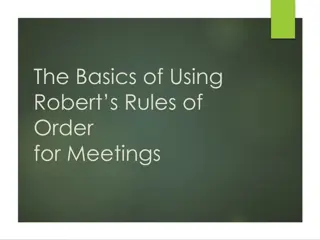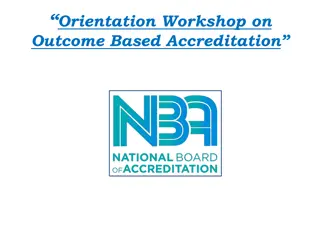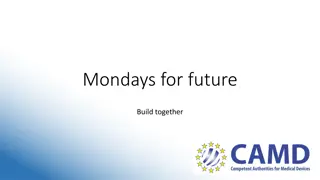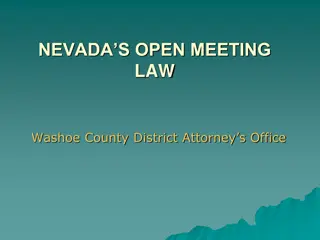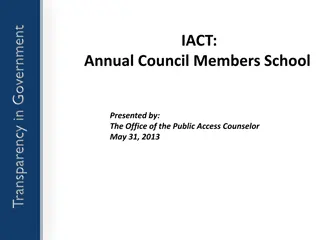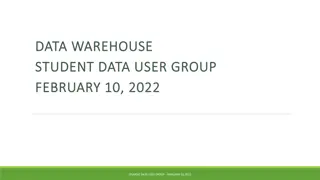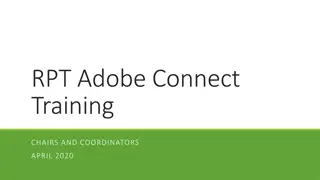Benefits of Face-to-Face Meetings in Overeaters Anonymous
Overeaters Anonymous (OA) emphasizes the importance of face-to-face meetings for individuals recovering from unhealthy food relationships. In-person interactions offer benefits such as combating isolation, providing physical connection, emotional support, fostering trust and safety, enabling non-verbal communication, and promoting fellowship and service opportunities. These meetings help individuals combat isolation tendencies, receive emotional support, build trust, socialize, and commit to their recovery journey through accountability and mutual understanding.
Download Presentation

Please find below an Image/Link to download the presentation.
The content on the website is provided AS IS for your information and personal use only. It may not be sold, licensed, or shared on other websites without obtaining consent from the author. Download presentation by click this link. If you encounter any issues during the download, it is possible that the publisher has removed the file from their server.
E N D
Presentation Transcript
(Created by Central Jersey Intergroup) B.F.F. (Benefits of Face-to-Face) meetings
Benefits of Face-To-Face Meetings Overeater s Anonymous (OA) is a community of people who, through shared experience strength and hope, are recovering from an unhealthy relationship with food. One of OA s most important attributes is the mutual support the program is able to provide. Meeting in-person helps people feel valued and gives them a chance to contribute to the group. Studies have proven time and time again there is simply no substitute for meeting face-to-face. Our program is built on face-to-face interaction (from the AA Big Book): Seeing much of each other, scarce an evening passed that someone s home did not shelter a little gathering of men and women, happy in their release, and constantly thinking how they might present their discovery to some newcomer. In addition to these casual get-togethers, it became customary to set apart one night a week for a meeting to be attended by anyone or everyone interested in a spiritual way of life. Aside from fellowship and sociability, the prime objective was to provide a time and place where new people might bring their problems.
Here are some benefits of face-to-face meetings: 1. Isolation helps resist isolation tendencies and comforts loneliness 2. Physical connection allows for holding hands, hugs, handshakes, etc. 3. Emotional support strong personal support for depression or hopelessness 4. Trust and Safety fosters an environment of honesty and confiding in others 5. Non-Verbal communication clearly see body language and facial expressions 6. Getting to know others easier to put a name with a face and personality 7. Joint effort supports strength in numbers & mutual understanding of disease 8. Fellowship encourages talking before and/or after the meeting on any subject 9. Socialization getting together for a meal or coffee/tea before or after meeting 10. Service provides opportunity to do service (move chairs, lead meeting, etc.) 11. Commitment attendance exhibits willingness for recovery & accountability. 12. Seventh Tradition easier to support OA at all levels financially.
1. Isolation The disease of compulsive overeating and unhealthy eating behaviors is one of isolation. Food convinces us to shut everyone and everything else out of our life in order to continue our harmful food behaviors in peace. Our minds tell us to get help from others, but our disease begs us to stay home perfectly content in the secret hiding place of our pain. Recovery asks us to step outside, to accept help and love from someone, and to eventually help others who suffer. This is best done in-person at a meeting with individuals who are also fighting the same disease and tendency to want to isolate.
2. Physical Connection The need for human touch is one of our most basic and primal needs. Touch deprivation is connected with negative health outcomes such as anxiety, stress, depression, and even immune system disorders. It has been found that touch calms our nervous system and slows down our heartbeat. Human touch also lowers blood pressure as well as our stress hormone - cortisol. It even triggers the release of oxytocin, a hormone known to help promote emotional bonding to others. Attending a face-to-face meeting provides an opportunity for human touch by holding hands, giving a hug, or simply patting someone on the back.
3. Emotional Support Emotional support is one of the strongest aspects of our program. Face-to-face connection with people fosters exchanging positive energy with one another and trust building. It means connecting with others who understand what you are going through and want to support and encourage you. In-person emotional support, like at a face-to-face meeting, makes people feel heard and understood and gives them a sense of belonging. Maslow s Hierarchy of Needs states some of the most important human needs are love and belonging, which includes our desire to connect with others, and be integrated into a group. When these needs are met, our overall well-being improves, and we live more engaged with people and experience less depression and hopelessness.
4. Trust and Safety Handling important moments face-to-face helps to encourage dialogue and build trust by sharing personal information honestly. When we are in-person and demonstrate willingness to have difficult conversations, it improves relationships by enhancing credibility and trust. It provides real-time insight on how others are receiving information and if they understand what you are saying and allows others to feel safe, supported, and listened to. Meeting in-person creates an environment that fosters the trust and safety people need in order to engage more fully. A top university spent hundreds of hours tracking success by collecting data about face-to-face interactions and the results showed the most valuable communication is done in-person due to the sense of empathy and intimacy it provides.
5. Non-Verbal Communication While non-verbal signals can be so subtle that we are not consciously aware of them, they truly help us communicate in a more effective manner. Different types of non-verbal communication, both positive and negative, are facial expressions; gestures; volume or tone of voice, body language, personal space, appearance, and eye contact. It is difficult to discern some or all of these non-verbal communications unless we are physically within proximity of the person, like when at a face-to-face meeting. All of our non-verbal behaviors can send a strong message and may put people at ease, build trust, and draw others towards us. Face-to-face communication visibly shows you are committed to meeting others where they are and engaging them on the journey of recovery.
6. Getting to know others Putting a name to a face boosts cooperation when people meet. Face-to-face communication helps to build relationships and get to know people. By sharing real stories and emotions you make connections to others that are important. Getting to know someone can go a long way; face-to-face interaction leads to a sense of community and camaraderie which can develop into stronger relationships in the long term. When communicating face-to-face, it has been shown people may demonstrate more respect for each other and a commitment for a successful outcome when navigating a sensitive issue.
7. Joint Effort It s not within our human nature to be capable of tackling every problem, every situation, every dilemma we come across entirely on our own. It doesn t matter how strong, smart, capable, confident or successful you are - we need each other because we have all tried before on our own and failed to control our disease. We were built to work together, to struggle together, to help each other move toward solutions and come out on the other side united. Even the greatest, strongest, most capable people don t reject help when they know they need it, understand their own weaknesses, accept them, and look to others for help. There is strength in numbers and none of us are as strong as all of us.
8. Fellowship OA is a fellowship of men and women who share their experience, strength and hope with each other so they can work on solving their common problems and help others to recover from unhealthy food behaviors one day at a time. By meeting face-to-face, we are able to talk with other OA members before and/or after each meeting about lots of things. This fellowship strengthens our bonds with each other and helps us get closer. We owe it to OA s future to keep our fellowship strong by meeting in-person and realize that our lives and the lives of those to come depend on it. Ongoing face-to-face meetings help to ensure the fellowship will continue.
9. Socialization OA is a social program, one that allows individuals to meet one another face-to-face and to benefit by shared recoveries. According to research, people who attend support help groups like OA confirm the aspect of meeting others who are dealing with the same issues in-person, sitting across from each other in a room and discussing mutual challenges, is absolutely essential to their recovery. Human beings are a social species who are wired to connect; being able to get together with other OA members either before or after a meeting for an abstinent meal or just a cup of coffee/tea, offers a chance for a deeper connection on a more personal basis.
10. Service In OA, everything starts with the group, as it is the basic building block of the entire program, and the place where recovery begins for most compulsive overeaters and those with unhealthy food behaviors. For a group to keep going, all kinds of service must be done, and in- person you can approach others one-on-one to do greater service. It is through the combined efforts of the group, and individual service of each member, that we can continue to thrive. Attending a face-to-face meeting provides several opportunities to do fundamental service such as putting out chairs, leading the meeting, taking care of literature, etc.
11. Commitment Remember when you said that you were willing to go to any lengths for your recovery? That was a commitment to take action in the OA program. Our program is one of action and one of the best actions we can take to honor our commitment is attend a face-to-face meeting. Showing up to an in-person meeting requires accountability and demonstrates willingness to accept responsibility for one s actions. It takes some sacrifice to go out into the rain, cold, or dark in order to be at an in- person meeting, but keeping our sanity is worth the price. Half measures avail us nothing and going to a face-to-face meeting is truly an extraordinary action in order to live up to our commitment to support our own recovery.
12. Seventh Tradition One of the important ways an OA member helps their recovery is by giving a donation in support of carrying the OA message. It is easy to make a voluntary contribution to assure that group expenses are paid by reaching into your wallet and pulling out a few bills to put into the basket passed around at an in-person meeting. Contributions ensure that groups have meeting space, phones get answered, there is OA literature for newcomers, relapsing members, and healthcare professionals. It also provides websites with meeting lists and information on events so OA members around the world can continue to share their experience, strength and hope in the OA program.
Questions + Answers Questions via chat (general or to a specific speaker)
SEVENTH TRADITION Our 7th Tradition states that OA is fully self-supporting, accepting contributions only from its members. While no fees or dues will ever be required for membership, OA needs help to keep its rooms open, provide opportunities for fellowship, and spread its message to those still suffering. Please consider accessing the (your IG name here) website at: (Your website address here) to make your 7th Tradition donation It is safe and easy PayPal is also an option (A donation of $5.00 is suggested)
OA RESPONSIBILITY PLEDGE Always to extend the hand and heart of OA to all who share my compulsion; for this I am responsible. We gratefully follow in the footsteps of many others who have walked this way before us, and we are gratified to be making footprints of our own for others to follow.
